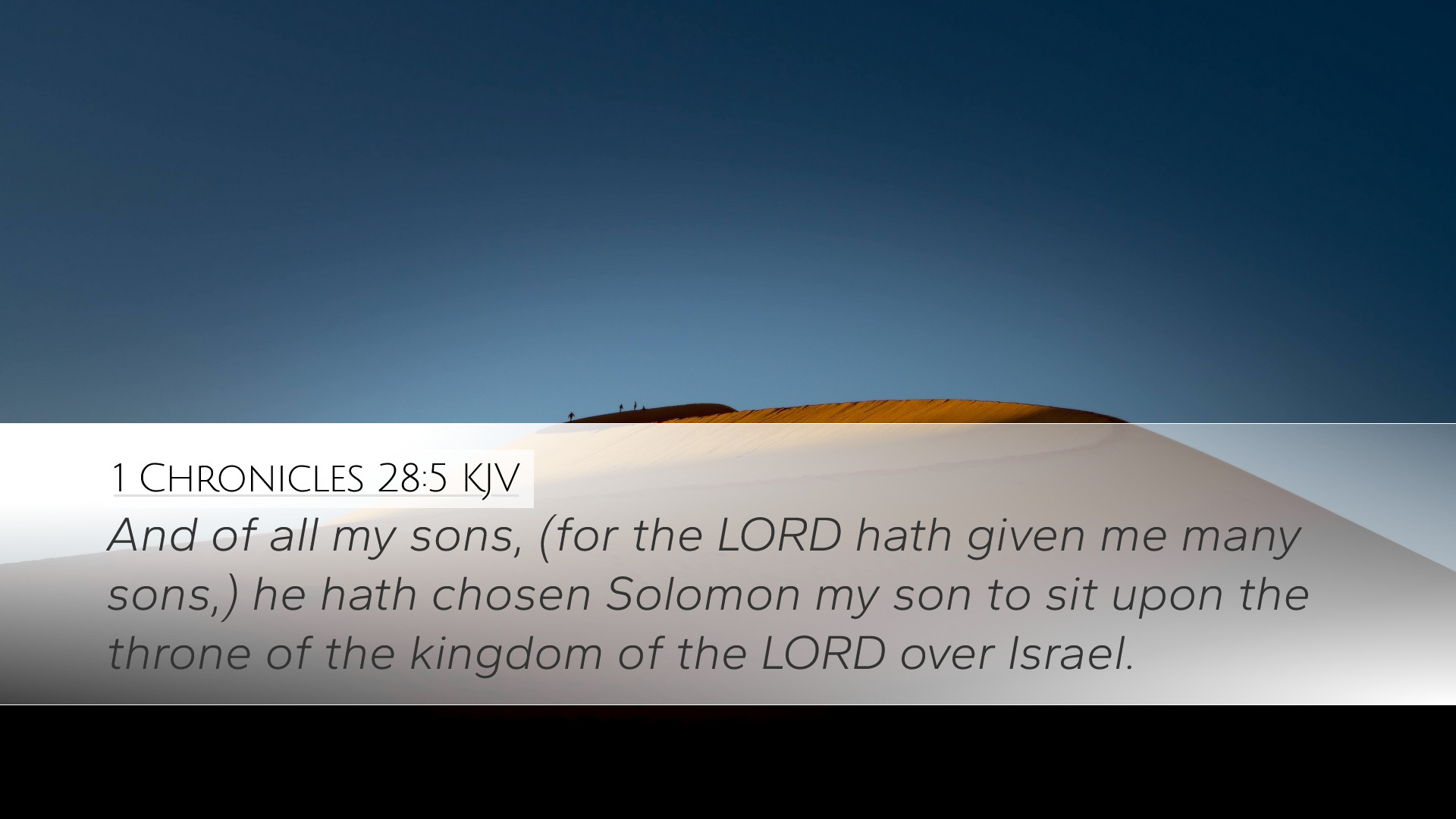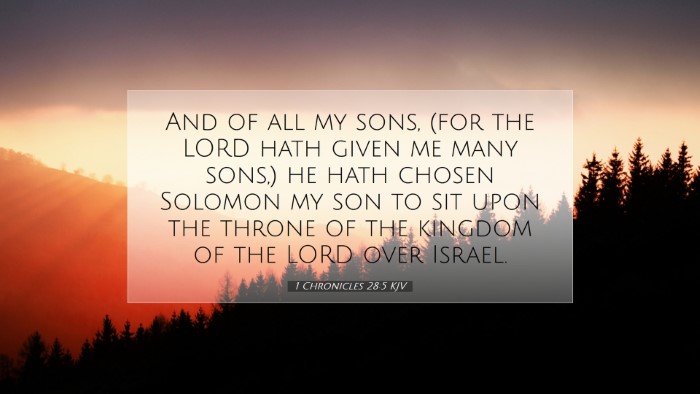Commentary on 1 Chronicles 28:5
Verse Reference: 1 Chronicles 28:5
Text: "And of all my sons, (for the LORD hath given me many sons,) he hath chosen Solomon my son to sit upon the throne of the kingdom of the LORD over Israel."
Introduction
The passage from 1 Chronicles 28:5 is significant in the narrative of David's reign, particularly concerning the succession of the throne. David, having witnessed the tumultuous reigns and the merciful hand of God, finds it appropriate to appoint his son Solomon as the future king. This choice is wrapped in divine purpose and human intent, significant insights into God's sovereignty and parental duties.
Contextual Background
The historical context of this verse is crucial for understanding the dynamics between David, his sons, and the unfolding of Israel's monarchy. David was blessed with many sons, yet the Lord's choice shines a spotlight on Solomon, emphasizing God's direct intervention in leadership.
The Selection of Solomon
David's declaration underscores the divine selection of Solomon. This principle of God's choosing a leader resonates through many biblical narratives. As noted in Matthew Henry's Commentary, the choice of Solomon illustrates the idea that God often selects individuals based on His purposes rather than human standards.
Theological Themes
- Divine Sovereignty: God's sovereignty is a recurring theme in Scripture. The selection of Solomon emphasizes that leadership is ultimately in the hands of the Almighty. Albert Barnes elaborates that this encapsulates God’s right to appoint kings and rulers according to His divine plan.
- Parental Responsibility: David's role as a father is highlighted in this narrative. His acknowledgment of Solomon as God’s chosen reflects a significant parental responsibility in guiding and preparing the next generation for leadership as Adam Clarke notes, characterizing David's earnest efforts to direct his children in the ways of the Lord.
- The Nature of Leadership: This verse opens discussions on the nature of godly leadership. The choices made in leadership roles should align with God’s vision for His people, further discussed in Henry's commentary, where he stresses the need for divinely appointed leaders who seek God’s wisdom in their governing.
Insights from Public Domain Commentaries
Matthew Henry's Perspective
Henry emphasizes that this verse is not merely a royal decree but an affirmation of God’s providence. He proposes that the multitude of David's sons did not guarantee success or righteousness in leadership but that Solomon’s selection was an act of grace that exemplifies God's decision-making process. Henry further remarks that this not only highlights God’s choice but also David's submission to divine will, finding peace in Solomon’s appointed role.
Albert Barnes' Analysis
Barnes adds depth by discussing the implications of Solomon’s selection on the future of Israel. He interprets the verse as a directive that realigns Israel to a monarch approved by God, echoing God’s covenantal promises to David and establishing a significant legacy. Barnes notes that this choice presages the wisdom that would characterize Solomon’s reign, linking back to God’s gifts and the responsibility that comes with them.
Adam Clarke's Commentary
Clarke offers another layer of understanding by stressing the necessity of divine endorsement in leadership roles. He reflects on David’s acknowledgment that, despite being a king, he is also a servant of God, underscoring humility as a requisite trait for leaders. He interprets Solomon’s selection as a pivotal moment in establishing a legacy that honors God, thereby setting the stage for future religious and political directions of Israel.
Application for Today
The message from 1 Chronicles 28:5 remains pertinent for contemporary leaders within the church and society. As leaders, there is a need to recognize the importance of divine guidance in our decisions. This verse encourages pastors, theologians, and ministry leaders to seek God’s wisdom in their pursuits and decisions, fostering an environment where future generations are pointed toward godliness and responsible leadership.
Reflection and Discussion
As we ponder over this verse, several questions arise for deeper contemplation:
- How can we discern God's choice in our leadership roles today?
- In what ways can we mentor the next generation towards fulfilling their God-given potential?
- What does it mean to embrace humility and divine endorsement in leadership structures within our communities?
Conclusion
1 Chronicles 28:5 provides a profound lesson in recognizing God’s sovereignty in the appointments of leadership. The choice of Solomon as king not only illuminates divine preference but also instructs us on the nature of rightful leadership. David’s actions serve as a model for those leading in faith today, emphasizing the importance of seeking and adhering to God’s will in all aspects of life and governance.


